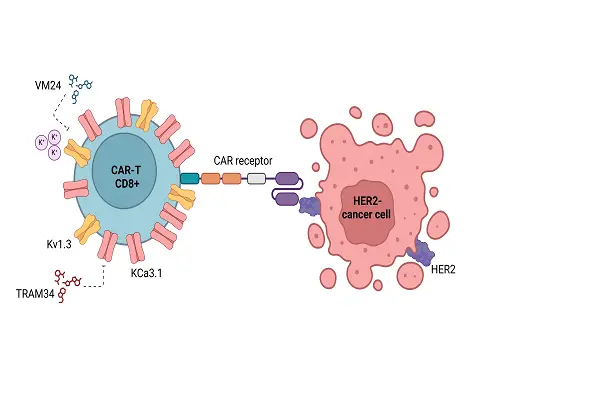 CAR T cell therapy is a breakthrough in the immunotherapy field. However, many side effects remain to be solved. Kv1.3 and KCa3.1 K+ channels stabilize the negative membrane potential of T cells to maintain Ca2+ influx through CRAC channels. Electrophysiological measurements showed that HER2-specific CAR T cells had higher KCa3.1 conductance compared to the control cells, which was more prominent in the CD8+ population. Conversely, the Kv1.3 expression level was the same for all cell types (CD4+/ CD8+, CAR, and NT). Single-cell Ca2+-imaging revealed that thapsigargin-induced SOCE via CRAC is suppressed in CD8+ CAR T cells. The use of specific antagonists of ion channels (Kv1.3: Vm24; KCa3.1: TRAM-34) improved the target cell elimination capacity of the CD8+ CAR T cells. These results imply that ion channels could be a target in improving CAR T cell therapy.
CAR T cell therapy is a breakthrough in the immunotherapy field. However, many side effects remain to be solved. Kv1.3 and KCa3.1 K+ channels stabilize the negative membrane potential of T cells to maintain Ca2+ influx through CRAC channels. Electrophysiological measurements showed that HER2-specific CAR T cells had higher KCa3.1 conductance compared to the control cells, which was more prominent in the CD8+ population. Conversely, the Kv1.3 expression level was the same for all cell types (CD4+/ CD8+, CAR, and NT). Single-cell Ca2+-imaging revealed that thapsigargin-induced SOCE via CRAC is suppressed in CD8+ CAR T cells. The use of specific antagonists of ion channels (Kv1.3: Vm24; KCa3.1: TRAM-34) improved the target cell elimination capacity of the CD8+ CAR T cells. These results imply that ion channels could be a target in improving CAR T cell therapy.
The findings of this study were published in the Cancers Journal (MDPI).
The image was done by Biorender. Publication License
DOI: 10.3390/cancers16223750
Link: https://www.mdpi.com/2072-6694/16/22/3750